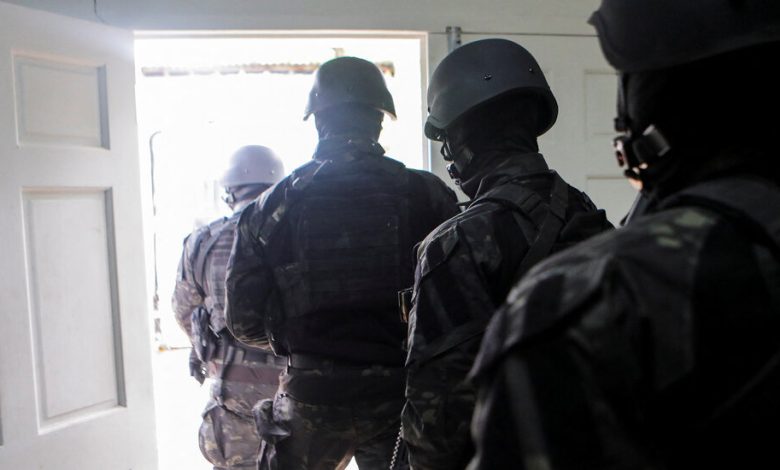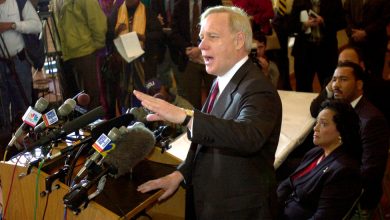Haiti Doesn’t Need More Guns. It Needs a New Government.

Years ago, I was part of a team set up under the auspices of the United Nations to vet new police officers in Haiti. We worked to create a professional force that would protect Haitians and purge it of officers connected to the neighborhood gangs that were mugging and kidnapping people for ransom.
Then, in 2011, a new president widely believed to have ties to the gangs and drug dealers came to power. The project fell apart, and our years of effort came to nothing.
Today, the Haitian National Police force is meager — roughly 9,000 officers,comparedwith about 16,000 in 2021. Many have left because they fear for their lives, outgunned by the large and powerful gangs that regularly smuggle weapons into the country. The force still contains many brave officers who risk everything fighting these gangs — and many who share police weapons, vehicles and plans with the outlaws. Most important, the force is controlled by politicians who have criminal connections.
On Monday, the United Nations Security Council approved a new plan to crack down on Haiti’s gang violence, greenlighting an offer from Kenya to lead a multinational armed security force in Haiti after Prime Minister Ariel Henry requested military assistance. Other nations are expected to join the fight and send forces to join the 1,000 security personnel Kenya has committed to deploy.
But another international force in Haiti will never work without a functional government in place. Haiti needs enormous assistance — but it must be overseen by a new transitional government made up of honest people committed to re-establishing democracy and the rule of law. They need to create the conditions for safe and fair elections, so that leaders unaffiliated with gangs can run for office and people will feel free to vote for them. Only under a credible and clean transitional government will police and security forces — from Haiti or anywhere else — be able to do their job.
The job of the last U.N. mission to stabilize Haiti, which ran from 2004 to 2017, was to neutralize and disarm gangs, reform the police and judiciary, and organize elections. Observers often point to the catastrophes that rightly gave that mission a bad name: In 2010, U.N. forces apparently introduced a cholera epidemic that killed some 10,000 Haitians and were accused of committing widespread sexual abuse.
But that’s not the whole story. The mission’s effort to improve security by dismantling gangs — and, by proxy, reforming the police force — failed, too, largely because the people arming the gangs were suspected to be some of the country’s most influential political leaders.
As part of that mission, my organization hosted biweeklymeetings from 2007 to 2012 to help vet the officers. Together with U.N. Police and Haitian police academy officials, we compiled information about 200 officers that we found to be corrupt. Officers received training in international law and human rights, and we made it easier for them to complain about bad colleagues. The police chief was serious about fighting gangs. We were hopeful, but the effort went nowhere after President Michel Martelly took office and appointed his own minister of justice.
Back then, political patronage of gangs was not nearly as widespread as it is today. Now government-connected gangs flaunt their access to state resources. My organization has documented that Vitel’Homme Innocent, a gang leader wanted by the F.B.I. for his role in the kidnapping of American missionaries, has been driving through Port-au-Prince in a motorcade since January that includes cars with license plates indicating a state vehicle, a government official and the Haitian National Police. We have also documented at least three recent instances when members of the G9 gang alliance used vehicles from the Haitian National Police and other state agencies — including, in two cases, armored vehicles — to fight rival gangs and massacre bystanders.
The consequences have been dire. Haitian gangs now have access to high-powered rifles, according to the United Nations, that they use along with other arms to control and terrorize the capital, Port-au-Prince, and much of the rest of Haiti. At least 2,500 Haitians have been killed in gang violence so far this year. The violence has prompted tens of thousands of Haitians to flee their country: The United States Border Patrol has encountered more than 172,000 Haitians at the southwestern border since 2021, and thousands more have come to America by boat.
Last fall, the United States and Canada imposed sanctions on Haitian political and business leaders for allegedly providing financial and operational support to gangs, drug trafficking, and corruption. The sanctions have hit some of the most powerful people in Haiti.
It is important to talk about the real goals of any international intervention. Brian Nichols, the U.S. assistant secretary of state for Western Hemisphere affairs, has said that the long-term goal of the United States in Haiti is the restoration of democracy. We must ask what is needed to help us get there. I believe the only answer is the creation of a fresh, clean, representative transitional government that is committed to vetting state agencies, restoring the rule of law and re-establishing democratic institutions.
Now that the United Nations is supporting a multinational force in Haiti, a transition government should also be part of the plan. It could be formed through internationally supported negotiations between pro-democracy civil society leaders and the politicians in power, none of whom were elected or have any constitutional legitimacy. The talks should specify what qualifications are required for an individual to join the transitional government — and, critically, what would be disqualifying, to avert yet another criminal takeover.
It wouldn’t be an easy task. But a new government formed along these lines would begin to bring long-awaited accountability to the police, as well as branches of government like the judiciary. Gangs would not disappear, but they would eventually exert less power and lose some of the vast territory they now control.
If such a transitional government is not realized and the current government carries on and eventually calls for elections, gangs will control the polls. Terrorized people will vote for gang-affiliated politicians and even gang leaders themselves, some of whom are entertaining the idea of running for office.
Supporting a credible, new transitional government is a critical opportunity for the United States and the international community to do right by Haiti. They should take it.
Pierre Espérance is the executive director of the National Human Rights Defense Network in Haiti.
The Times is committed to publishing a diversity of letters to the editor. We’d like to hear what you think about this or any of our articles. Here are some tips. And here’s our email: [email protected].
Follow The New York Times Opinion section on Facebook, Twitter (@NYTopinion) and Instagram.



